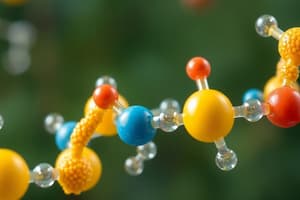Podcast
Questions and Answers
What percentage of the dry weight of the human body is constituted by a few key elements?
What percentage of the dry weight of the human body is constituted by a few key elements?
- 75%
- 100%
- 90% (correct)
- 50%
Which of the following elements is NOT mentioned as being important in cells?
Which of the following elements is NOT mentioned as being important in cells?
- Carbon
- Calcium
- Oxygen (correct)
- Iodine
What type of biomolecules serve as the building blocks for proteins?
What type of biomolecules serve as the building blocks for proteins?
- Nucleotides
- Amino acids (correct)
- Monosaccharides
- Fatty acids
Which of the following macromolecules are considered biopolymers?
Which of the following macromolecules are considered biopolymers?
What is the primary role of carbohydrates in biological systems?
What is the primary role of carbohydrates in biological systems?
Why is carbon considered a unique element of life?
Why is carbon considered a unique element of life?
What aspect of carbon allows for the formation of unbranched and branched chain structures?
What aspect of carbon allows for the formation of unbranched and branched chain structures?
Which biomolecule serves as the fundamental basis of structure and function in cells?
Which biomolecule serves as the fundamental basis of structure and function in cells?
Which of the following best describes lipids?
Which of the following best describes lipids?
What constitutes the building block of ribonucleic acid (RNA)?
What constitutes the building block of ribonucleic acid (RNA)?
Which of the following is true regarding prokaryotic cells?
Which of the following is true regarding prokaryotic cells?
What is the primary function of glycogen in cells?
What is the primary function of glycogen in cells?
What is the major component that contributes to more than 60% of the chemical composition in a normal human body weighing 65 kg?
What is the major component that contributes to more than 60% of the chemical composition in a normal human body weighing 65 kg?
Which biomolecule acts as a repository of hereditary information?
Which biomolecule acts as a repository of hereditary information?
What structural components are lipids primarily associated with?
What structural components are lipids primarily associated with?
What is the building block of proteins?
What is the building block of proteins?
Which of the following diseases is associated with a defect in lysosomal hydrolases?
Which of the following diseases is associated with a defect in lysosomal hydrolases?
What is the primary function of lysosomes in a cell?
What is the primary function of lysosomes in a cell?
What role does catalase play in peroxisomes?
What role does catalase play in peroxisomes?
What type of cellular organelles are peroxisomes classified as?
What type of cellular organelles are peroxisomes classified as?
Which of the following enzymes is NOT found in lysosomes?
Which of the following enzymes is NOT found in lysosomes?
The accumulation of which pigment has been implicated in the aging process?
The accumulation of which pigment has been implicated in the aging process?
Which of the following statements about lysosomes is true?
Which of the following statements about lysosomes is true?
What happens to the degraded products of lysosomal activity?
What happens to the degraded products of lysosomal activity?
What is the primary biochemical importance of glyceraldehyde?
What is the primary biochemical importance of glyceraldehyde?
Which monosaccharide is primarily a component of RNA?
Which monosaccharide is primarily a component of RNA?
What is the role of D-Ribulose in biological processes?
What is the role of D-Ribulose in biological processes?
Which of the following sugars is found as a constituent of DNA?
Which of the following sugars is found as a constituent of DNA?
Which sugar is recognized as the 'sugar fuel' of life?
Which sugar is recognized as the 'sugar fuel' of life?
What is the main biochemical importance of D-Xylose?
What is the main biochemical importance of D-Xylose?
Which monosaccharide undergoes excretion in urine as a result of essential pentosuria?
Which monosaccharide undergoes excretion in urine as a result of essential pentosuria?
What is the significance of D-Erythrose in carbohydrate metabolism?
What is the significance of D-Erythrose in carbohydrate metabolism?
What is maltose composed of?
What is maltose composed of?
Which coenzyme is identified as a component of lipids?
Which coenzyme is identified as a component of lipids?
What type of bond connects the units in maltose?
What type of bond connects the units in maltose?
How are amino sugars formed?
How are amino sugars formed?
Which compound is a sweetener often used in sugarless products?
Which compound is a sweetener often used in sugarless products?
Which monosaccharide derivative is commonly found in cell membranes?
Which monosaccharide derivative is commonly found in cell membranes?
Which aldehyde group is involved in reducing reactions in sugars?
Which aldehyde group is involved in reducing reactions in sugars?
What characterizes the structure of D-Glucosamine?
What characterizes the structure of D-Glucosamine?
Flashcards are hidden until you start studying
Study Notes
The Chemical Basis of Life
- Carbon is the most predominant element in living organisms, contributing to the formation of countless complex compounds due to its ability to form stable covalent bonds and chains.
- Life is composed of lifeless chemical molecules, with even a single bacterial cell containing thousands of different types of molecules.
- Organic compounds, such as amino acids, nucleotides, and monosaccharides, serve as the fundamental building blocks for complex biomolecules, including proteins, nucleic acids, and polysaccharides, respectively.
Major Biological Macromolecules
- Proteins: Primarily responsible for the structure and function of cells, encompassing both static and dynamic roles.
- DNA (Deoxyribonucleic acid): Acts as the repository of hereditary information, containing the genetic code.
- RNA (Ribonucleic acid): Essential for protein biosynthesis, playing a key role in the translation of genetic information into proteins.
- Polysaccharides (e.g., glycogen): Serve as a storage form of energy to meet immediate cellular demands.
- Lipids: Act as a long-term energy reservoir and key structural components of cell membranes.
Cellular Organization
- Macromolecules assemble into supramolecular structures, such as membranes, which further organize into organelles, cells, tissues, organs, and ultimately, the complete organism.
Cellular Diversity
- Prokaryotes: Lack a well-defined nucleus and exhibit a relatively simple structural organization. Examples include bacteria.
- Eukaryotes: Possess a defined nucleus and a more complex cellular structure.
Lysosomes
- Lysosomes are spherical vesicles, enclosed by a single membrane, functioning as the "digestive tract" of the cell.
- They contain hydrolytic enzymes that break down cellular components, including proteins, lipids, carbohydrates, and nucleic acids.
- Lysosomal enzymes play a critical role in maintaining cellular homeostasis by degrading and recycling cellular components.
- Dysfunctional lysosomal activity can lead to various disorders, such as arthritis and muscle diseases.
Peroxisomes
- Peroxisomes, also known as microbodies, are single-membrane bound organelles involved in various important cellular processes.
- They contain the enzyme catalase, which protects the cell from the toxic effects of hydrogen peroxide (H2O2) by converting it to water (H2O) and oxygen (O2).
- Peroxisomes are involved in the breakdown of long-chain fatty acids, and the synthesis of plasmalogens and glycolipids.
- Plant cells contain glyoxysomes, a specialized type of peroxisome involved in lipid metabolism.
Studying That Suits You
Use AI to generate personalized quizzes and flashcards to suit your learning preferences.



